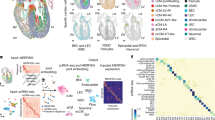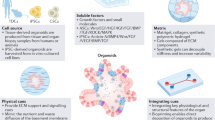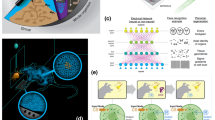Abstract
MOUSE teratocarcinoma cells have been recognised as important material for studying in vitro the processes of determination and differentiation that take place during normal embryogenesis1,2. But in order for the system to be exploited maximally, it must be possible to manipulate at will the differentiation of mass cultures of pluripotent cells into endoderm, ectoderm and mesoderm derivatives. Martin and Evans showed that they could trigger the appearance of endoderm cells in undifferentiated cultures of the SIKR teratocarcinoma line by suspending aggregates of the cells in bacteriological Petri dishes to which they could not adhere3,4. Within about 2 d the aggregates developed into simple embryoid bodies, resembling egg cylinders of normal embryos with an outer layer of endoderm cells surrounding a core of undifferentiated cells. In some SIKR clones, but not others, the inner cells later differentiate into neuroectoderm and mesoderm and the embryoid bodies develop fluid cysts resembling the visceral yolk sac vesicles of normal early embryos cultured in vitro. Not all lines of pluripotent teratocarcinoma cells, however, can be induced to form embryoid bodies in such a convenient way (ref. 5 and my observations). This could be because certain teratocarcinomas are for some reason intrinsically unable to form embryoid bodies, or because the cells can lose this ability during cultivation in vitro. In the course of isolating a new clonal line of teratocarcinoma cells I noticed that their ability to differentiate was strongly influenced by the way in which they were maintained in vitro. As long as the cells were grown on layers of feeder fibroblasts they retained the ability to form embryoid bodies but this was progressively lost as the cells were adapted to grow on gelatin-coated dishes.
This is a preview of subscription content, access via your institution
Access options
Subscribe to this journal
Receive 51 print issues and online access
$199.00 per year
only $3.90 per issue
Buy this article
- Purchase on Springer Link
- Instant access to full article PDF
Prices may be subject to local taxes which are calculated during checkout
Similar content being viewed by others
References
Sherman, M. I., and Solter, D., (eds), Teratomas and Differentiation (Academic, New York, 1975).
Martin, G. R., Cell, 5, 229–243 (1975).
Martin, G. R., and Evans, M. J., Proc. natn. Acad. Sci. U.S.A., 72, 1441–1445 (1975).
Martin, G. R., and Evans, M. J., in Teratomas and Differentiation (edit. by Sherman, M. I., and Solter, D.), 169–187 (Academic, New York, 1975).
Sherman, M. I., in Teratomas and Differentiation (edit. by Sherman, M. I., and Solter, D.), 189–205 (Academic, New York, 1975).
Stevens, L. C., Devl Biol., 21, 364–382 (1970).
Nicolas, J. F., Dubois, P., Jacob, M., Gaillard, J., and Jacob, F., Ann. Microbiol. Inst. Pasteur, 126 A, 3–22 (1975).
Lehman, J. M., Speers, W. C., Swartzendruber, D. E., and Pierce, G. B., J. cell. Physiol., 87, 13–28 (1974).
Author information
Authors and Affiliations
Rights and permissions
About this article
Cite this article
HOGAN, B. Changes in the behaviour of teratocarcinoma cells cultivated in vitro. Nature 263, 136–137 (1976). https://doi.org/10.1038/263136a0
Received:
Accepted:
Issue Date:
DOI: https://doi.org/10.1038/263136a0
This article is cited by
-
A Combined Epithelial Odontogenic Tumor? A 7-Year Follow-Up Case
Head and Neck Pathology (2017)
-
Histological and cytological technique for the quantitation of cultured human bone-marrow cells: Formation of aggregates
In Vitro (1978)
-
In vitro culture and differentiation of normal mouse blastocysts
Nature (1977)
-
Isolation of a human teratoma cell line which expresses F9 antigen
Nature (1977)
Comments
By submitting a comment you agree to abide by our Terms and Community Guidelines. If you find something abusive or that does not comply with our terms or guidelines please flag it as inappropriate.



